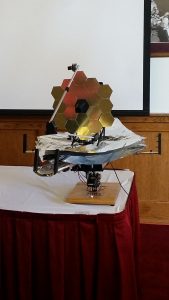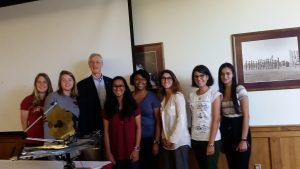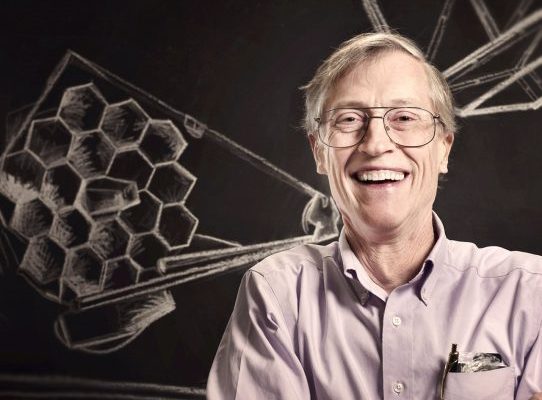What does it feel like to win the Nobel Prize?
On Thursday, Sept. 22, 2016, Florida Tech hosted Prof. John Mather. Prof. Mather, along with George F. Smoot, were awarded the Nobel Prize in Physics in 2006, for their work using the COBE satellite to measure the heat radiation from the Big Bang. Needless to say, it was a big deal to have the opportunity to interact with a Nobel Laureate. Yes, it’s the secret dream of every physics / astrophysics major to win a Nobel Prize in Physics, but, as a college student, it feels like something so far away on the horizon, almost beyond the realm of possibility. That’s why it was so reassuring to find out that Prof. Mather is one of the most humble people I have met. Here are a few snippets from his interactions with students.

He gave a talk about the James Webb Space Telescope (JWST), however, here, I am focusing on personal interactions as those don’t happen too often… And they are much richer and leave a lasting impact. I’m not sure I remember the exact dimensions of JWST but I know I’m not going to forget the following:
The Nobel Prize is a Big Deal. Naturally, he gets asked some questions ever so frequently, but he answered them all with a smile and approached them simply, as if it was the first time he was doing so…
The Questions
Q. How did you win the Nobel Prize?
A. I don’t know. Somebody came up to me with a project and said, “Hey, would you like to do this?” And I said “yes.”
I’d like to add that that’s just how life works. For looking back is the only way we can connect all the dots. The best we can do is to find our passion and keep working on what makes us happy.
Q. How does it feel to be a Nobel Prize winner?
A. Honestly, I feel just as I felt the day before I knew I had won it.
Q. What was the ‘yes’ moment for you?
A. It was a few weeks after it [COBE] was up, and I’d gone home and was asleep when a few of my colleagues called me and told me they’d received data. And I was like, “YES!!”
The [Nobel] Prize comes years and years later. The excitement isn’t there anymore.
I had asked this last question, because I wanted to confirm my hunch from someone’s experience that it’s the little things like these that turn out to be more significant than the apparently ‘big’ ones. And now I know they do.
He had some really interesting things to say about the JWST and about science too:
“We don’t know what surprises JWST has in store for us. That’s the great thing about science. We’re always working on something we do not know. We’re always being surprised. Hubble found at least 10 things we had never known. We don’t know what we might find. As scientists, people think we are the authority on everything. That we know everything. Truth is, we don’t know.”
That is precisely what science is! We dive into the unknown fueled by curiosity, never anticipating what we might find.

Save





